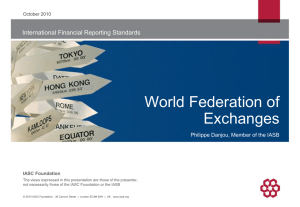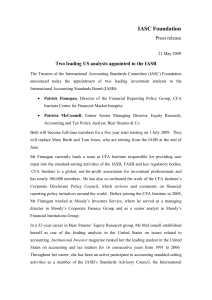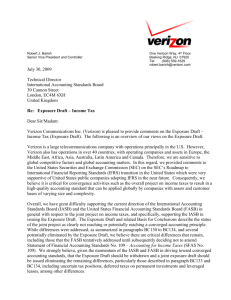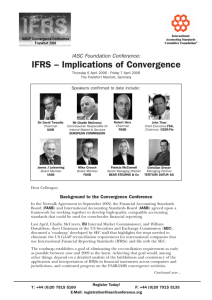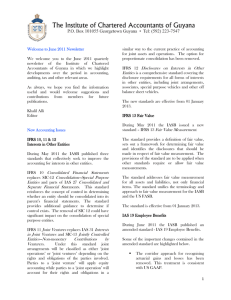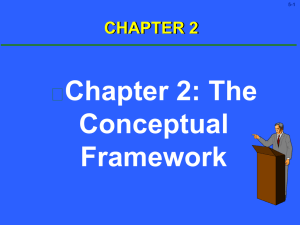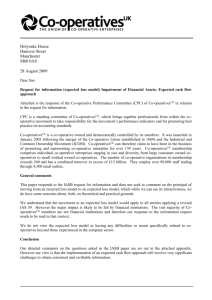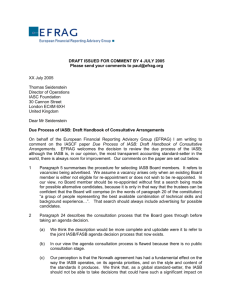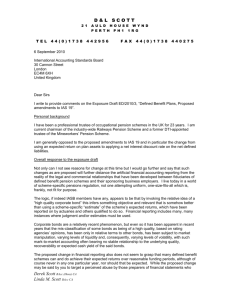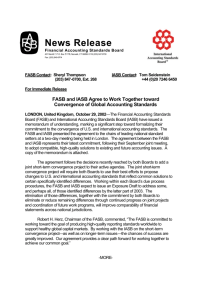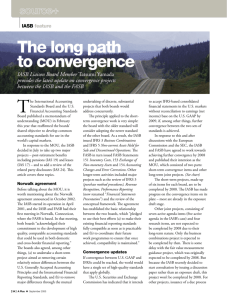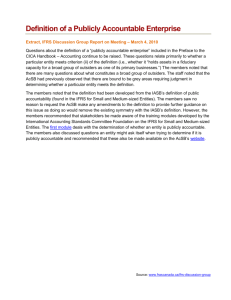In an exclusive interview, Hans Hoogervorst, Chairman
advertisement
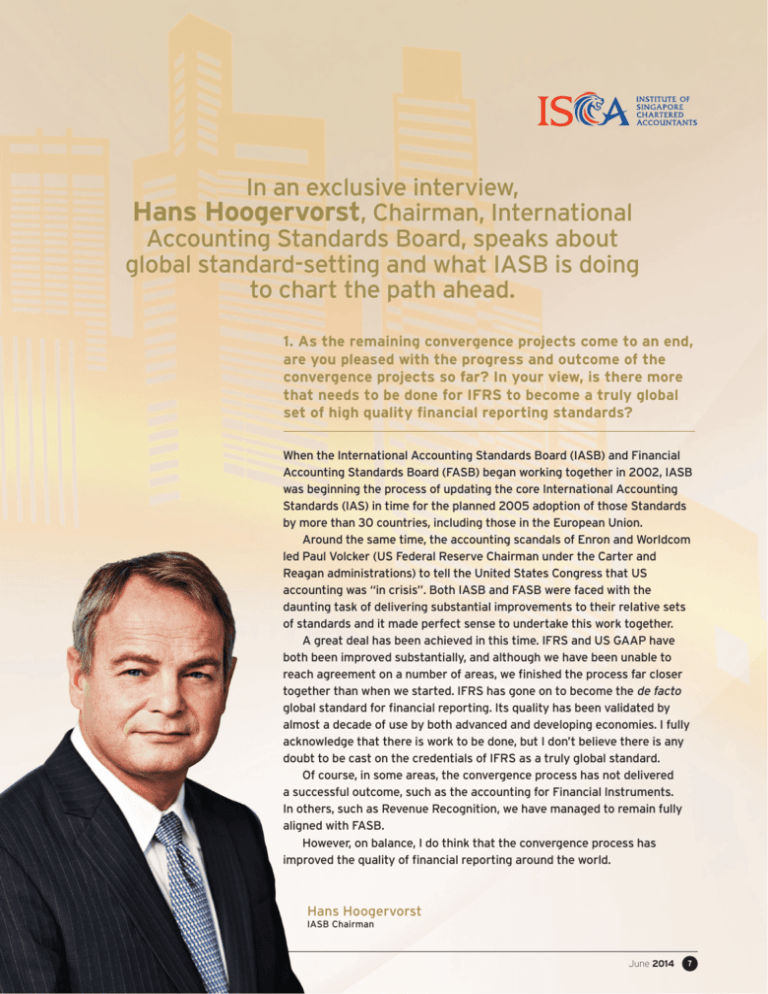
In an exclusive interview, Hans Hoogervorst, Chairman, International Accounting Standards Board, speaks about global standard-setting and what IASB is doing to chart the path ahead. 1. As the remaining convergence projects come to an end, are you pleased with the progress and outcome of the convergence projects so far? In your view, is there more that needs to be done for IFRS to become a truly global set of high quality financial reporting standards? When the International Accounting Standards Board (IASB) and Financial Accounting Standards Board (FASB) began working together in 2002, IASB was beginning the process of updating the core International Accounting Standards (IAS) in time for the planned 2005 adoption of those Standards by more than 30 countries, including those in the European Union. Around the same time, the accounting scandals of Enron and Worldcom led Paul Volcker (US Federal Reserve Chairman under the Carter and Reagan administrations) to tell the United States Congress that US accounting was “in crisis”. Both IASB and FASB were faced with the daunting task of delivering substantial improvements to their relative sets of standards and it made perfect sense to undertake this work together. A great deal has been achieved in this time. IFRS and US GAAP have both been improved substantially, and although we have been unable to reach agreement on a number of areas, we finished the process far closer together than when we started. IFRS has gone on to become the de facto global standard for financial reporting. Its quality has been validated by almost a decade of use by both advanced and developing economies. I fully acknowledge that there is work to be done, but I don’t believe there is any doubt to be cast on the credentials of IFRS as a truly global standard. Of course, in some areas, the convergence process has not delivered a successful outcome, such as the accounting for Financial Instruments. In others, such as Revenue Recognition, we have managed to remain fully aligned with FASB. However, on balance, I do think that the convergence process has improved the quality of financial reporting around the world. Hans Hoogervorst IASB Chairman June 2014 7 SINGAPORE ACCOUNTANCY CONVENTION 2014 #SAC2014_SG 2. With the focus on standard-setting shifting away from the US, how is IASB engaging the larger accounting community globally with regard to standard-setting? More importantly, what is being done to engage the profession here in Asia and in your view, how can Asia further contribute to the future of standard-setting globally? In the early days of IASB, our relationships with other standard-setters were conducted on a bilateral basis. As use of IFRS spread further around the world, that model became untenable – it was inefficient for us to be dealing with numerous important stakeholders individually. Therefore, over the last two years, we have overseen a shift to a more multilateral and inclusive standard-setting model. Key to this is the Accounting Standards Advisory Forum (ASAF), which provides us with an important mechanism to strengthen our cooperation with the international standard-setting community. Thanks to ASAF, giving feedback to IASB proposals is no longer primarily a bilateral event, but a multilateral endeavour. ASAF members do not just discuss with IASB, but also with each other. Asia has an important role to play in this new model. The Asian-Oceanian StandardSetters Group (AOSSG) is a very important stakeholder in our work. With a seat on the ASAF, AOSSG is able to represent the views of the entire region and not just one particular economy. It is important to us that standard-setting is not seen as being exclusive to larger economies; we want to hear the voices of all our constituents, and we encourage them to participate. 8 IS Chartered Accountant 3. What are the top priorities for IASB in charting the path forward for the profession in the next five years now that the major projects on Revenue Recognition and Financial Instruments are near completion? There are several key IASB projects in the pipeline which include the reform of the Conceptual Framework, Exposure Draft on Leases and the Disclosure Initiative. In your view, how will these projects improve the quality of financial reporting and strengthen the profession as a whole? The Conceptual Framework sets out the basic underlying concepts for the preparation and presentation of financial statements, forming the basis for specific recognition and measurement requirements in IFRS. It therefore serves as a major point of reference in the development of new Standards so it is particularly important that we work to get the definitions right. The Disclosure Initiative is another important project. There is a general consensus that “disclosure overload” is a problem that needs to be addressed, but very little consensus on how we should do this. One of the main problems is that of companies employing a “boxticking” mentality in the preparation of financial reports. On our part, one of our priorities will be to look at making incremental improvements and clarifications to our own Standards that set out to drive behavioural change. I think these two projects will considerably improve the foundations upon which future standards are built. We have received a great deal of helpful feedback on both over the last year, and I look forward to the continued participation of our constituents going forward. In the shorter term, it is important that we complete the remaining convergence projects. With regard to Leasing, I believe that our proposals will have a very positive impact on a complicated area. Currently, most lease contracts are not recorded on the balance sheet, despite the fact that they usually contain a heavy element of financing. For many companies, such as transportation, telecommunication and retail companies, the leverage caused by leases can be substantial. Some concerns have been raised over the cost implications of the new Leases standard to preparers. However, I believe that that some of these fears have been somewhat overstated. An effect analysis conducted recently by IASB staff shows that the Leases standard will only affect significantly fewer than 10% of listed companies. However, in those economic sectors that are significantly affected by the Leases standard, it will bring much needed insight in the true leverage of companies. June 2014 9 SINGAPORE ACCOUNTANCY CONVENTION 2014 #SAC2014_SG 4. Fair value measurement is becoming more and more pervasive in today’s financial reporting. Do you think there is a fundamental shift in the objective of financial reporting from one of monitoring of performance (a backward-oriented, stewardship approach) to one which enables users to predict cash flows (a future-oriented, investment-focused approach)? Do you think acquiring a valuation qualification is no longer a choice but a necessity for professional accountants? Ultimately, I think the goal of financial reporting should be to provide users of financial statements with the information they need to make informed decisions on the performance of an entity. IASB uses fair value where it believes this reflects the economics of a transaction or item that will be most relevant to investors, but we also measure items at amortised cost where we feel it is applicable. For example, should a company record gold (as inventory) at its cost, even if the value decreases? What about gold that it holds for trading? Is cost or fair value more relevant information? Should investment properties be held at cost if they are held as investments? If not cost, what is the best price to base fair value on – the possible sales price today, or in 10 or 20 or 100 years? Keep in mind that gold price has trebled in the last 10 years. So in that sense, there has been no fundamental shift in the objective of financial reporting. We simply seek to use the tools available that are best suited for that particular job. Stewardship is still at the heart of what we aim to achieve. IASB does not believe that either assessing prospects for future cash flow or providing inputs investors need to assess the quality of management’s stewardship is more important than the other. Both are important for making decisions about providing resources to an entity, and information about stewardship is also important for resource providers who have the ability to vote on, or otherwise influence, management’s actions. Mr Hans Hoogervorst is one of the distinguished speakers at the Accounting Conference on July 31, at the Singapore Accountancy Convention 2014. Join him and other accounting and business luminaries at the Convention themed “Staying Ahead of the Curve" from July 30 to August 1. Register now at www.singaporeaccountancyconvention.sg 10 IS Chartered Accountant
